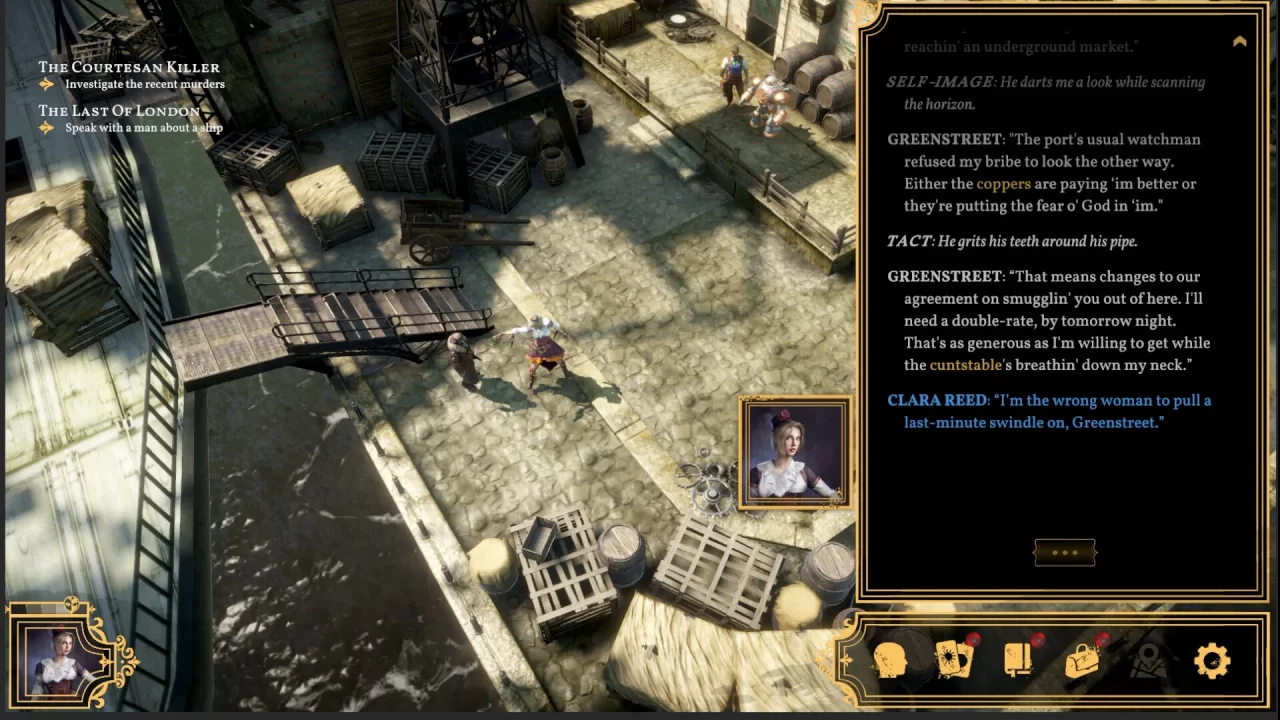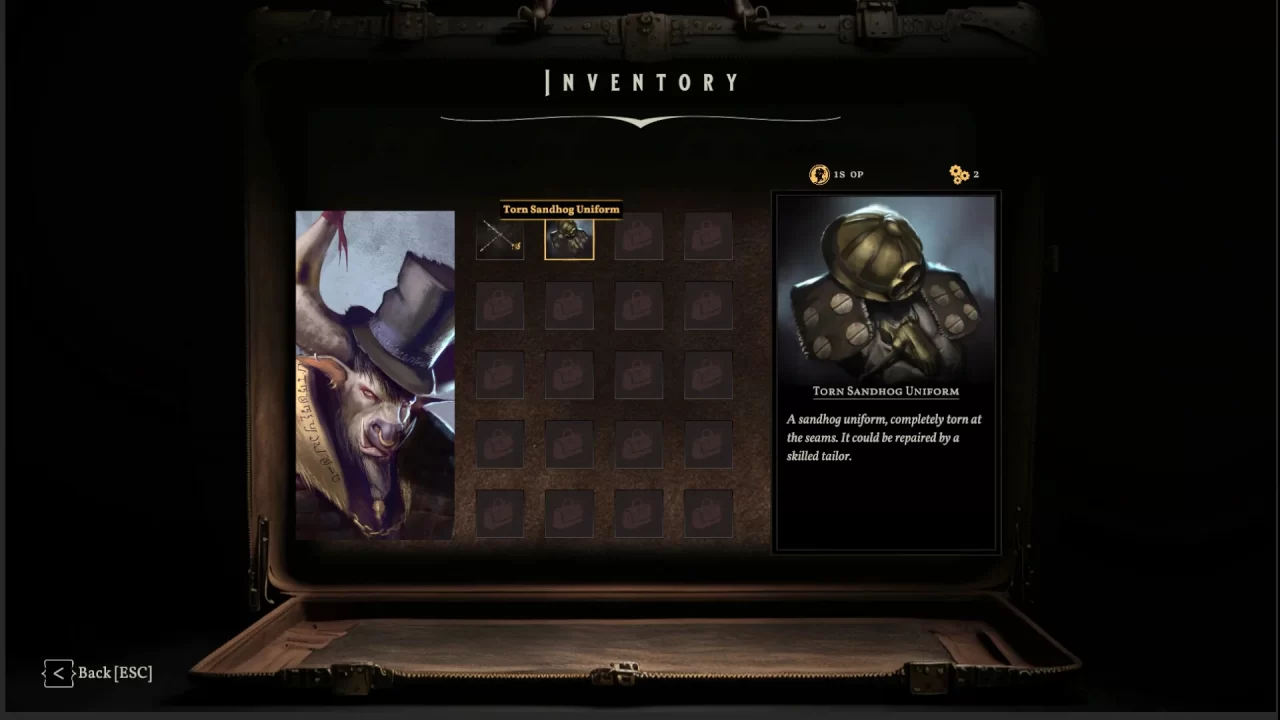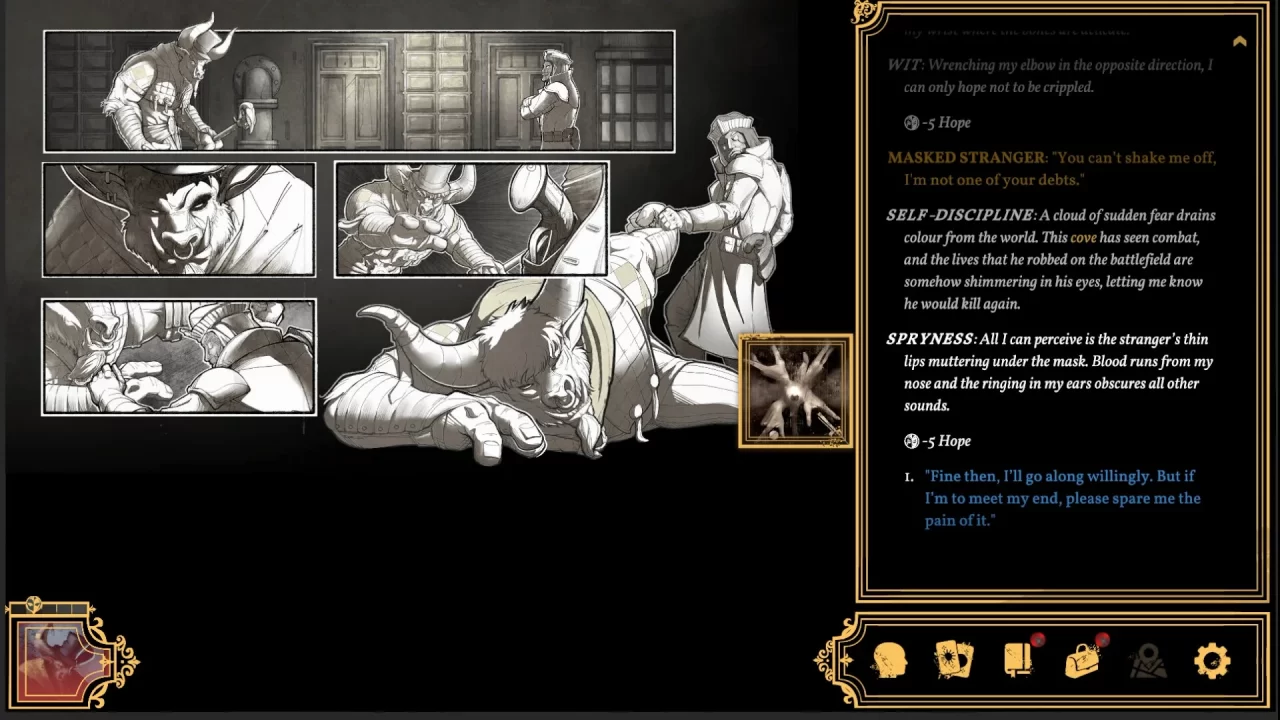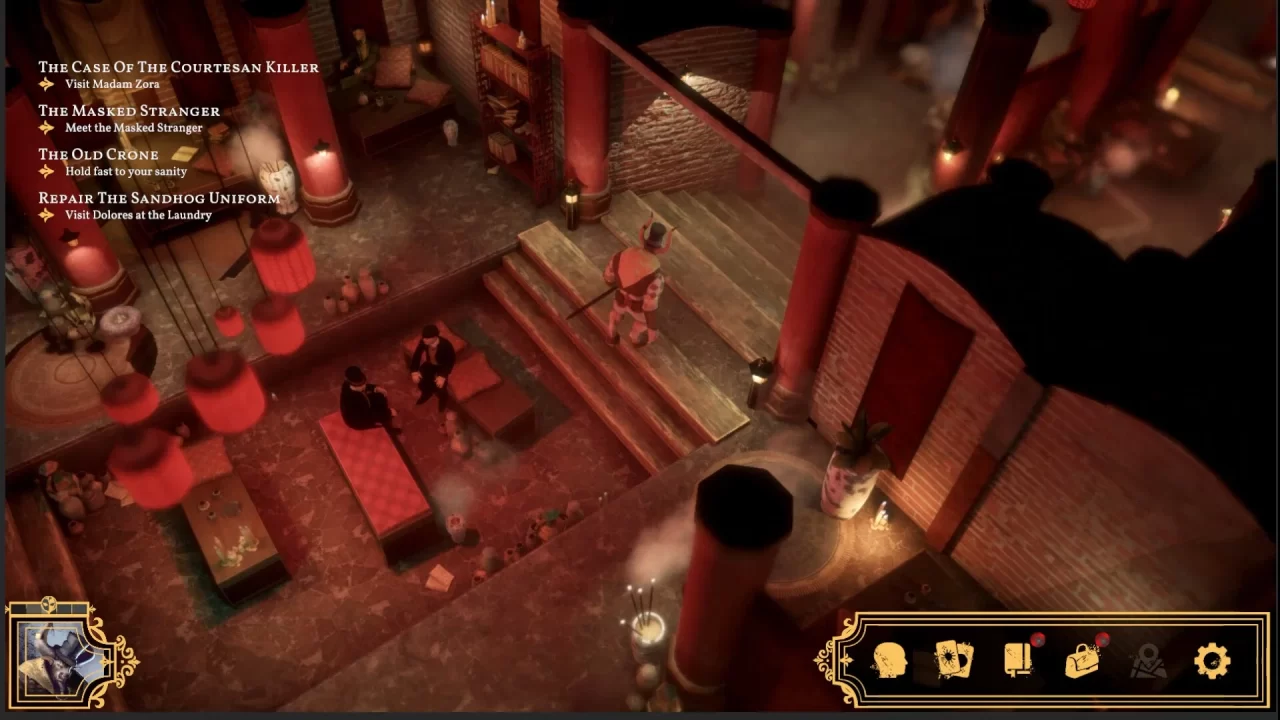Innovative game styles that catch on leave behind a blueprint of sorts that others can repurpose for completely different games. If another developer is creative enough, they can dress it up in a new outfit as if showing off the glorious, life-changing armor they found after slaying that legendary creative monster. If you’re a fan of the manic style of
Disco Elysium but perhaps would enjoy a setting with more minotaurs and monocles, then the world of
Sovereign Syndicate might be more your flavor. Good artists may borrow, and great artists may steal, but does this attempt from
Crimson Herring Studios make a good enough accounting of itself to justify cribbing from one of the modern video game masterpieces?
The world of
Sovereign Syndicate is set in a Victorian-era
steampunk-infused London with a traditional Western fantasy flair. That is, you get the airships, automatons, a shadowy upper crust, and a newspaper boy with grime on his face. But in this case, that newspaper boy happens to be a cyclops. There are dwarves and werewolves, and the aforementioned minotaurs join cyclopses as fantasy races who rarely get their day in the sun but are common in
Sovereign Syndicate. Though steampunk fashion is rather popular now, it rarely features as a video game setting. The added fantasy aspect gives it a unique atmosphere that I found to be plenty fun and would be jubilant to see more of.

Walking and talking to yourself is what it’s all about.
It helps that the writing and characters are a joy to dig into and take Oscar Wilde as inspiration, as evidenced by the quotes on the game’s loading screens. Take Atticus Daley, the sad sack minotaur, who, when we meet him, is living through the consequences of a lifetime of regretful behavior. The player characters of
Sovereign Syndicate do a lot of living inside their head, which washes into the gameplay. The writing is verbose with language you might hear in Ye Olde England, as you’d hope for in a Victorian-era story. The streets of this patch of London become well-trod as you make your way back and forth, exploring and meeting the residents.
Joining Atticus are Clara Reed, Teddy Redgrave, and Teddy’s automaton pal, Otto. Though Atticus doesn’t always go looking for trouble, it often finds him anyway, and he’s as like to wake up in a gutter as in his bed. Clara, a human woman, is currently a lady of the night, though her current employment is more of a stop between gigs — she hopes. Don’t let her job fool you; she’s a well-traveled veteran of the world of skullduggery and is not to be trifled with should a situation arise. Teddy the dwarf is a monster hunter by day and mad tinkerer by night, or is it the other way around? As you may glean from his choice of company, his automaton, he prefers solitude, being more comfortable in the company of a machine than man. Though Otto is merely steel, he’s got a personality, which people around town take note of. He’s not exactly self-aware. Then again, what if he could be? The dynamic between Teddy and Otto made them my favorite protagonists to follow in my time with
Sovereign Syndicate. Helping Atticus and Clara overcome their personal trials and tribulations was on the slower side but enjoyable, too. These characters are each on their own journey, though they wander the same streets and worry over the same worrisome current events bothering the town and occasionally cross paths.
Sovereign Syndicate shifts player control between these characters as they try to find their way through a London in the throes of the rise of industry. There’s a stark divide between the upper crust and the common person, eking out whatever living they may or scrounging for coin on the streets. The protagonists are all put upon in some way, whether it’s being buried in late rent or the day-to-day travails of sex work. Any way you look at it, they’re falling through society’s cracks. Then, there are the everyday dangers of working and living in the seedy underbelly. Prominent entrepreneur Lord Braxton publicly puts on an altruistic persona. However, his air of charity is betrayed by his lavish home outside the city and his gaudy airship, from which people say he’s plotting something that doesn’t bode well for London’s lower class. It’s a sleepy, contemplative story, as the protagonists struggle to reconcile their pasts and muddle their way through their current situations. The slower pacing is not always a problem, but the sluggishness does cause issues when it comes to some of
Sovereign Syndicate‘s ambitions. The narrative plays the long game, taking time to set up major events, though thankfully, without being too predictable about where things are going. Based on the ending,
Sovereign Syndicate is merely the first 15-hour chapter of a potentially much longer story.

Haven’t you ever seen a minotaur in a top hat?
Sovereign Syndicate primarily plays like a point-and-click game — quite similar to
Disco Elysium specifically — where you click on items and characters in the environment to interact with them. The areas you maneuver your character through tend to be huge, full of characters to have conversations with and important items and sights that have the potential to set you on sidequests, giving it the impression of a more open environment. There are about five large areas that you turn over time and again, which gets a little old. At the same time, it also pleasantly began to feel like home.
The nuances of
Sovereign Syndicate come up whenever you interact with items or characters. Each protagonist has several internal voices, representations of their stats, that vie for control of any situation. For instance, Atticus’ Wit clashes with his Animal Instinct, as he considers himself a minotaur of culture, yet as an anthropomorphic bull, he has difficulty controlling his temper. In a conversation or when examining an object, you’ll often have several options for a response or an action, giving more control to your chosen voice. Occasionally, you must make skill checks based on the strength of your chosen voice. In many games, skill checks are performed via dice roll or RNG, but in this case, it’s done using numbered tarot cards for a novel touch.
The only problem with all of this — unfortunately, a substantial problem — is that the novelty wears thin too quickly. Though the writing has its sparkling moments, this style of prose isn’t sharp enough to convey one internal voice as being distinctive from the others. The writing style is appropriately dense and chewy, which is wonderful, but it clashes with the developers’ ambitions. It got to the point where I would skim right over the voices’ attribution, especially in long stretches of dialogue. Not to knock a small studio for limitations, but
Sovereign Syndicate has little voice acting, and the delivery of skilled voice actors could have made individual voices more distinguishable. If you remove the attribution labels for the voices, many passages would read as a standard internal monologue for the protagonist, and you wouldn’t know the difference. The most interesting moments of this system came up when I had to choose one dialogue option over another, greyed-out choice, as if Atticus’ sensibilities weren’t strong enough to restrain his Animal Instinct, thereby getting him into a fistfight. But these moments are rare.

Had I not been so bull-headed, mayhap I would have avoided involving myself in yon fisticuffs.
The other main issue is that it didn’t seem possible to get a game over in
Sovereign Syndicate. Admittedly, it was relaxing to make my choices with only narrative consequences. But in a game that felt as though there should have been high stakes, I never felt my choices could put my characters in any real danger, and therefore, my actions felt mostly inconsequential. Though the tarot skill check system aided the atmosphere, it felt too random, as though the skills I had cultivated didn’t matter that much either.
Sovereign Syndicate still finds modest success as a somewhat intriguing story with deep explorations of its characters; it just doesn’t measure up to the developers’ grander ambitions, as the entire conceit of the gameplay doesn’t quite work.
Despite being seen from an isometric view, the world is popping with details. The character models have modest animations, but their portraits are more vibrant and bring them to life. Regularly seeing cyclopses and minotaurs wearing top hats, bowties, and suspenders is surprising and makes
Sovereign Syndicate more distinctive than if it had featured more overdone fantasy races like elves and halflings. The steampunk style is always eye-catching, and Crimson Herring’s rendition is thought-provoking. There aren’t a ton of cutscenes, but they’re presented as stylish motion comics, which also look great. The music sets the mood well, but the small selection means the variety is limited. The one musical number with a singing performance is excellent and gives the character an extra endearing quality. Ambient sound effects are subtle but a nice touch.
Sovereign Syndicate is controlled almost entirely with the mouse. Unfortunately, you have no control over the camera, which is problematic in a game where you need to be able to see everything in the environment. Being required to click repeatedly to move your character through the large areas gets old. The story apparently branches to some degree, and it’s common to find a few bugs in games like that. Unfortunately, I ran into some that made it impossible for me to advance on a couple of occasions. Thankfully, Crimson Herring was incredibly responsive in fixing them prior to release, so this has no effect on my score or final verdict.

London’s underbelly is seedy indeedy.
Sovereign Syndicate is a game of highs and lows. If there is to be more to the story, the gameplay portion would need some rethinking to make it work. But on the positive side, I loved the world and characters, and I’d be excited to see more of them. If you’re in it for those elements, then
Sovereign Syndicate shouldn’t disappoint. After all, everyone loves a sharp-dressed minotaur.





































![Glory to Codexia! [2012] Codex 2012](/forums/smiles/campaign_tags/campaign_slushfund2012.png)




